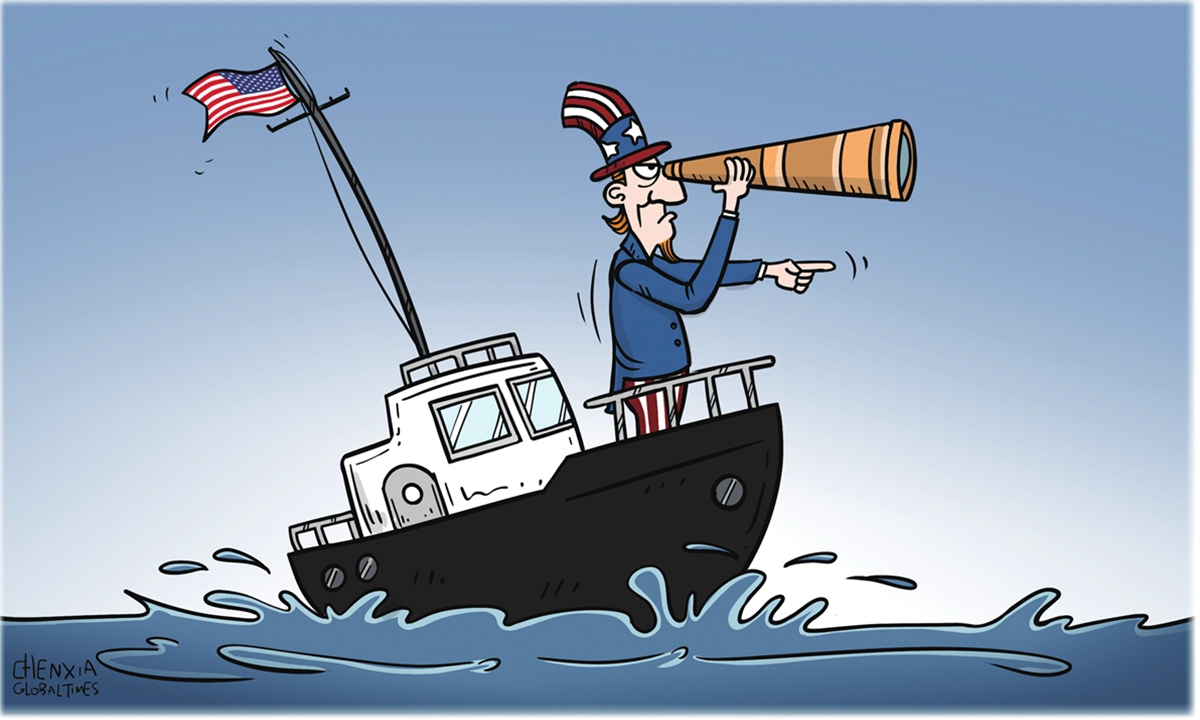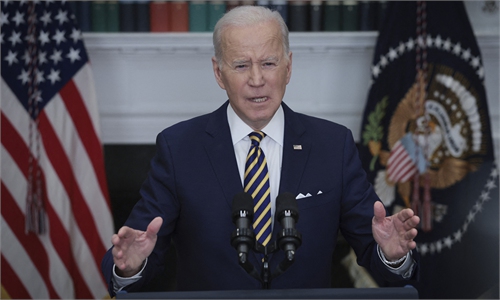US tries to throw dirty water on China hyping ‘illegal fishing’: Global Times editorial

US Asia-Pacific Illustration: Chen Xia/GT
China-Vietnam cooperation achieved fruitful results during General Secretary of the Communist Party of Vietnam Central Committee Nguyen Phu Trong's visit to China. A joint statement issued by the two countries pointed out that the two sides reached consensus on the text of an agreement on search and rescue at sea and an agreement on establishing a hotline on emergencies in maritime fishing activities, and agree to sign them early. On the same day with the release of the joint statement, the US media, however, brought up old irrelevant news, which appeared to be strange and abrupt. It's reported that in August this year, a fleet of Chinese squid-fishing boats had a "confrontation" with a US Coast Guard cutter in the eastern Pacific waters of South America, and that the Biden administration is considering to sanction relevant Chinese fishing vessels. At this time, as the issue of "illegal fishing" is being hyped up, it is inevitable for people to suspect that it is a deliberate move to stir up trouble.There is another background to the issue. In May, the US-dominant Quad put forward a major maritime initiative: the Indo-Pacific Partnership for Maritime Domain Awareness (IPMDA) which covers the Indian Ocean, Southeast Asia and South Pacific waters in order to monitor and combat activities including illegal fishing. Three months later, for the first time, the US Coast Guard dispatched a heavily armed ship to the eastern Pacific region to implement "law enforcement" and engaged in a "confrontation" with Chinese fishing boats. Anyone with a discerning eye can see that the entire operation was aimed at China, in other words, it intended to find fault with China. Even if it can't frame China, it wanted to throw dirty water on China. "Illegal fishing" is the dirty water that the US put in buckets in advance and used it to splash China.
China has developed distant-water fishing for decades, and signed a series of bilateral and multilateral agreements and international treaties, including the United Nations Convention on the Law of the Sea. China also adopts a "zero-tolerance" policy on illegal fishing and implements strict supervision of distant-water fisheries. In recent years, the crackdown on illegal fishing and rectification has achieved remarkable results, and many breakthroughs have been made in international cooperation with relevant countries. But at this time, accusations of "illegal fishing" of China by the US and Western public opinion have surged unexpectedly, and even some Hollywood stars came to fan the flames. This anomaly would not have arisen without the push from Washington.
Since the Trump administration, the so-called illegal fishing of China has become an excuse for the US to smear China's image and alienate China's relations with relevant countries. The Biden administration not only took over this "legacy," but also "upgraded" it. On the one hand, it packaged itself with its usual beautiful words such as "global ocean health," but on the other hand, it gave the so-called crackdown on China's "illegal fishing" a strategic connotation of "containing" China and expanding US' global presence.
Look at the "old news" hyped by the US media, people can better understand Washington's true intentions. The so-called standoff occurred on the high seas near the Galapagos Islands of the South American country of Ecuador. The US came uninvited and intervened. Ironically, despite US' efforts to slander China, Ecuadorian Foreign Minister Juan Carlos Holguín spoke highly of China-Ecuador fishery cooperation on many occasions. In February this year, Ecuadorian President Guillermo Lasso was invited to visit China, and the two sides issued a joint statement in which they agreed to deepen cooperation in the field of fishery. That is to say, the issue is not about intractable problems, but the US tries hard to create trouble out of nothing
It is obviously very targeted that the US makes Southeast Asia, where Vietnam is located, and South America, where Ecuador is located, as two key areas for provoking disputes over "illegal fishing." To put it bluntly, where US' focus on containing China is, the attention on China's "illegal fishing" is there. After China and the Solomon Islands signed a security cooperation framework agreement, the US started to pay high attention to the Pacific Island Countries. Its officials visited there one after another, and the so-called illegal fishing issue has been continuously hyped up and amplified. As Washington is hyping the ''illegal fishing'' issue in South America, it is anxious about its diplomatic "loss of points" in South America. The US has even claimed that South America has become China's "backyard," which is judging others by oneself.
The US claims itself to be a "world coast guard," but it is not after all. The US has not yet ratified the United Nations Convention on the Law of the Sea. Not only that, the number of days of its seine fishing vessels operating on high seas has far exceeded the number of days specified by relevant fishery management organizations, and it has violated the regulations for many consecutive years. The US is a complete "ocean bully." It may feel a little diffident now, therefore, it incites other countries in order to form a "maritime joint defense team" as a guise. But in any case, the overbearing and selfishness of the US cannot be concealed. It wants to use "illegal fishing" to throw dirty water on China, but in the end, it must be Washington itself who will get dirty.

